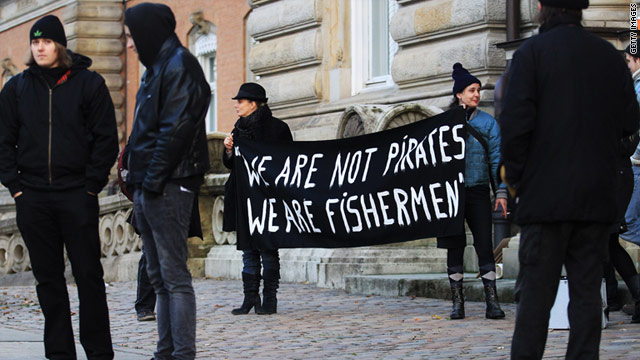
As many of have probably heard, there was a recent Somalian pirate attacks that left 4 Americans dead. Furthermore, pirate attacks have been headlining news stories for the past couple years now. Pirates now want more and more ransom and have become more violent. The latest event with the American casualties clearly emphasizes how dangerous the open seas are becoming.
But according to this article:
http://www.cnn.com/2011/OPINION/02/26/etzioni.stop.piracy/index.html?hpt=C2
it's quite difficult to stop these pirate attacks. One, pirates are criminals, so the army/navy has no jurisdiction over their handling. They would be if they were considered terrorists. So in many cases, the army has simply confiscated illegal weapons and destroyed pirate motherships, but let the pirates go home free. The police can't bring these pirates to criminal court most of the time because the ocean is out of their jurisdiction. Or, some pirates simply dump their weapons overboard and claim the message in the picture up top, "We are fishermen, not pirates." What a bunch of Somalian bullsh*t.
Let's be real here. Either start getting armed marshals on these ships or treat these pirates as terrorists. Like the editorial states, they are terrorists. They're terrorizing civilians and international commerce. To think, that we still have pirates even after all these years... I mean this isn't Treasure Island.
Why is it surprising that we still have pirates? Piracy isn't too different from burglary, or hijackings, or other hostages situations. Yes, it's probably more spectacular than any of those aforementioned crimes, but believing that no crimes are committed on seas convey billions of dollars of freight per year can be a little naive. Similarly, I think you're over simplifying the issues associated with law enforcement on the high seas. It's certainly plausible that individual countries are capable of dealing with the pirates; however, sometimes by attempting to so they run afoul of numerous sovereignty issues. If one country can hunt down pirates anywhere they pleased, who's stopping others from the same country exploiting the natural resources contained within the ecosystems located in the waters of another country's jurisdiction. I subscribe to the argument that if this problem is indeed so serious that it so cripples the ability of trade to be conducted, then more stringent action would be taken. Certainly if the problem does become so serious that it's crippling, then arrangements can be made, and since this hasn't happened, I trust that the parties involved have performed the cost/benefit analysis and concluded that it isn't worth their while (yet) to very aggressively pursue these criminals.
ReplyDeleteI don't think you understand that it definitely is crippling trade and commerce. These pirates are asking for HUGE sums of money as ransom. I don't think I'm over simplifying, I told you exactly how difficult it is to deal with these parties because the police have no sovereignty over criminals in the seas because it is out of their jurisdiction. Therefore, the best case is to deal with these criminals as terrorists so that the navy and the army can deal with them. The navy obviously has sovereignty in their own seas. Or an even simpler action of having armed marshals (like on international flights). If you read the article, I think you would understand how much more serious this situation is. Most pirate attacks aren't even reported because of the fear of rising costs and bad publicity for companies.
ReplyDeletePiracy, especially in places like Somalia, is a product of the country's government and domestic state of affairs. Somalia has lacked a central government since 1991, which leads to a difficult livelihood for citizens who must fend for themselves to obtain a living. For many in Somalia, adequate income cannot be obtained by a measly fisherman's budget. Since these waters are considered international and Somalian officials are unable to police the outlaws, they continue to thrive in the region. On the issue of terrorism, Somalia is well-known for training many of the Eastern African terrorists. But, I think it is unfair to label all of the pirates as terrorists. When was the las time you heard about the US offering aid or a helping to stabilize the Somalian government? Never, because the US government realizes there are no profitable resources in the area and feel no need to intervene. The piracy in Somalia often provides a living for entire communities and regions who cannot survive without the ransom money. Rather than simply label Somalians as terrorist, maybe we should try to better understand the underlying issues in the region and provide aid that might increase structure in the fragmented country.
ReplyDelete